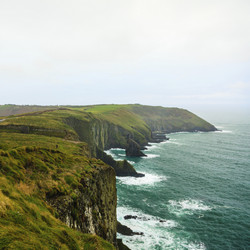The Atlantic – international research cooperation for our shared resource
Speaking at the conference The Atlantic – Our Shared Resource: Making the Vision Reality(opens in new window) in Brussels, Carlos Moedas, Commissioner for Research, Science and Innovation, underlined the importance of the Atlantic and other oceans as live-supporting resources and our responsibility to protect them and harvest their abundance. He also pointed to the international impetus towards cross border Atlantic research which was formalised two years ago with the signing of the Galway Statement on Atlantic Ocean Cooperation(opens in new window). In order to ensure that current and future generations can benefit from the wealth of the oceans, we will need to make significant strides forward in terms of research – for example improving our ocean observation and forecasting capacity, our understanding of ocean dymanics and our capacity to disseminate knowledge on oceans to the public. According to the Commissioner, the Galway Statement, which launched a research alliance on the Atlantic between the EU, the USA and Canada, will be a powerful tool in achieving this progress. However, as the Commissioner noted, the current alliance is ripe for extension to include our Atlantic neighbours to the south including Brazil, South Africa and Cape Verde. He stated, ‘Like the ocean itself, the ocean research community has no borders … A true transatlantic cooperation on the Atlantic Ocean cannot be confined to its Northern shores. The success of this initiative is intrinsically linked to its expansion from the Arctic to the Antarctic – only then can we begin to understand the risks, challenges and opportunities we are facing. For these reasons, I consider the extension of the Atlantic Ocean Research Alliance to the South Atlantic a priority for the next five years.’ By building on the success of the existing alliance, the Commissioner predicted that we could achieve specific research aims such as developing new predictive capacity for the major risks and changes of the North Atlantic Ocean and Circulation System and mapping critical areas of the Atlantic seafloor to improve the accuracy of our predictive models. This research progress and more will be essential not just for protecting our people and planet but for ensuring a thriving ‘blue economy’ into the future. The blue economy currently represents roughly 5.4 million jobs and has a gross added value of almost EUR 500 billion a year. By 2020, the Commissioner predicted, this could increase by 1.6 million jobs with an added value of around EUR 600 billion. The driving sectors will range from bio-tech and renewable energy to aquaculture and mineral resources. The Horizon 2020 programme is backing blue research for blue growth by dedicating EUR 145 million to this area for 2014 to 2015. The Commission's work programme for 2016 to 2017 will invest even further, particularly in bringing marine research closer to market. Indeed, a host of recently launched Horizon 2020 projects were presented throughout the two-day conference. As Commissioner Moedas concluded, the question is no longer, what lies beyond the horizon or who can get there first? The question is now: how can we best work together to protect our greatest natural resource, while enjoying the wonders it has to offer? For further information, please visit: Horizon 2020: Food Security, Sustainable Agriculture and Forestry, Marine, Maritime and Inland Water Research and the Bioeconomy http://ec.europa.eu/programmes/horizon2020/en/h2020-section/food-security-sustainable-agriculture-and-forestry-marine-maritime-and-inland-water(opens in new window)
Countries
Austria, Belgium, Bulgaria, Brazil, Canada, Cabo Verde, Cyprus, Czechia, Germany, Denmark, Estonia, Greece, Spain, Finland, France, Croatia, Hungary, Ireland, Italy, Lithuania, Luxembourg, Latvia, Malta, Netherlands, Poland, Portugal, Romania, Sweden, Slovenia, Slovakia, United Kingdom, United States, South Africa



